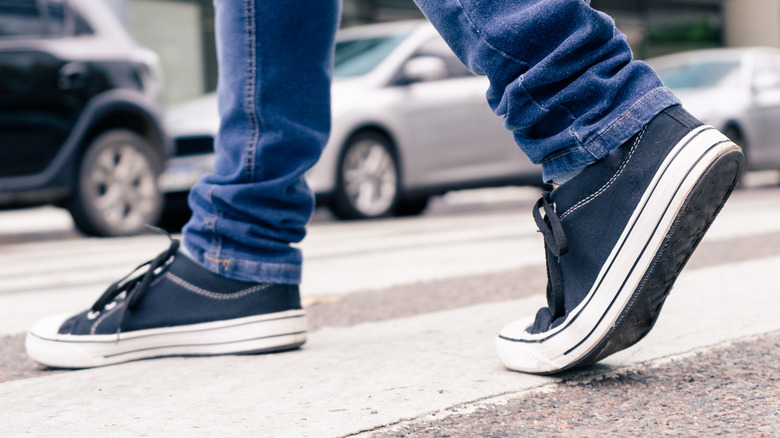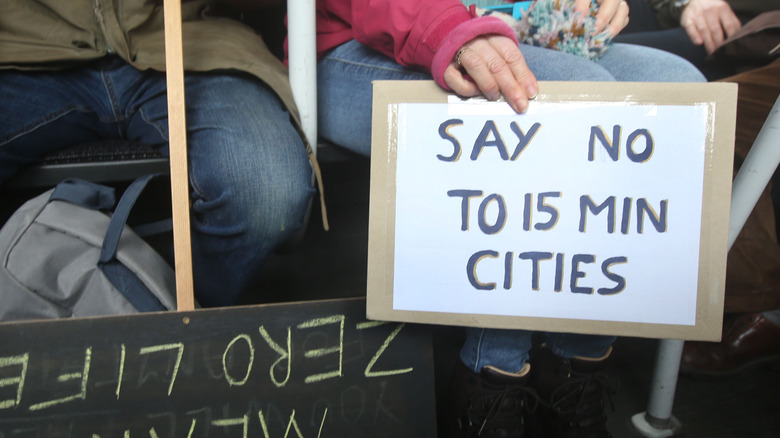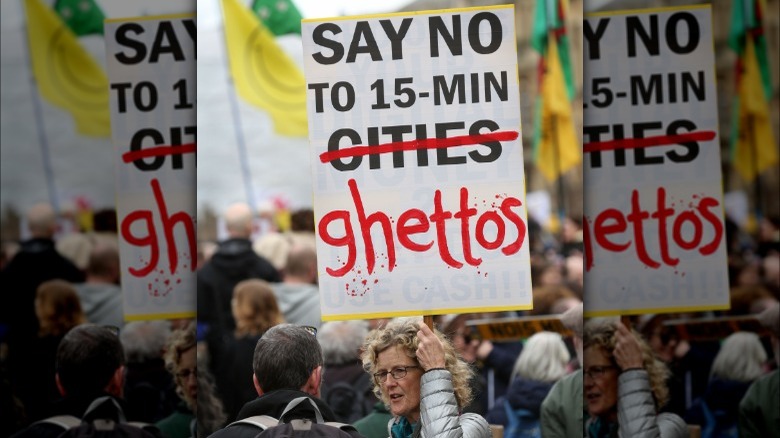The 15-Minute City: How Conspiracy Theorists Made Walkable Neighborhoods Their Boogeyman
Living in a neighborhood where everything you need is only a 15-minute walk away from your home may sound nice to most people, but according to certain extremist viewpoints, an approach to civic planning known as the "15-minute city" is yet another example of how global powers have conspired to take away freedoms, the Associated Press reports. Increasingly popular in the U.K. and the U.S., city officials who have adopted this type of design note that, in theory, 15-minute cities are meant to bring essential services closer to people's homes, making it easier to walk where people need to go without driving.
That way, experts say, CO₂ emissions and traffic will be reduced, and people will be more easily able to enjoy the many health benefits of walking. For many online conspiracy theorists, though, citing no evidence, the 15-minute city will instead lead to restricted movements, forced relocation, and an inability to leave a person's neighborhood without permission. According to the AP, one Instagram post viewed more than 5,000 times said, in a 15-minute city, "you will be constantly monitored by surveillance cameras to ensure that you don't leave your designated residential zone without first being authorized to do so." According to urban planners, that couldn't be farther from the truth.
The 15-minute city idea began in France
Though not exactly a new idea, the current 15-minute city approach to urban planning was developed in France by Professor Carlos Moreno from the University of Paris 1 Pantheon-Sorbonne, and later championed by Paris' Mayor, Anne Hidalgo in her 2020 reelection campaign. Since then, the idea has become popular as far away as Cleveland, Ohio, and New York City, among other places, Blue Zones writes. Leading American cities with the potential to adopt a 15 or 20-minute approach to future civic planning and urban development include places like Portland, Oregon, and Seattle, Washington, The Urbanist notes.
Urban planners say a 15-minute city would be laid out how cities were designed before the primacy of the car and the highway, before suburban development when people were forced to drive to get most things they need. One area of the world where the 15-minute city idea is increasingly popular is in the U.K. where conspiracy-minded pushback has proliferated, The Guardian reports. Those anxieties likely stem from frustrations surrounding COVID-19 restrictions leading to so-called climate lockdowns, and another widespread unfounded online theory called the "Great Reset," an often misunderstood initiative from the World Economic Forum adopted in the pandemic's aftermath (via the World Economic Forum).
King Charles III supports 15-minute cities in England
In 2020, then-Prince Charles — now King Charles III of England — released a video supporting the concept of 15-minute cities in the U.K., where the planning approach has already been adopted in places like Oxford, The New York Times writes. In Oxford, efforts to limit traffic in certain areas and implement 15 or 20-minute city urban planning have been controversial, leading to misinformation regarding the objectives of these proposals, and protests from the community. According to Paris professor Carlos Moreno who's championed the 15-minute city idea, a concept that's been around in one form or another for decades (via Forbes): "Their lies are enormous."
Moreno added that anti-15-minute city activists claim citizens will be locked in their neighborhoods and cameras will signal who can go out, and if your relatives live in other areas, permission will be required to see them. Referring to traffic filters adopted as part of Oxford's 15-minute city plan, city officials clarified citizens will still be able to drive where they want to whenever they want to, their route might just be adjusted. The traffic filters will not be physical barriers, as conspiracy theorists claim (via Oxford City Council). According to Nate Storring from the Project for Public Spaces, a New York nonprofit supporting 15-minute cities (via the AP): "The point is to provide more freedom of choice as to where a person can comfortably and affordably live in the city, not to prevent freedom of movement."


